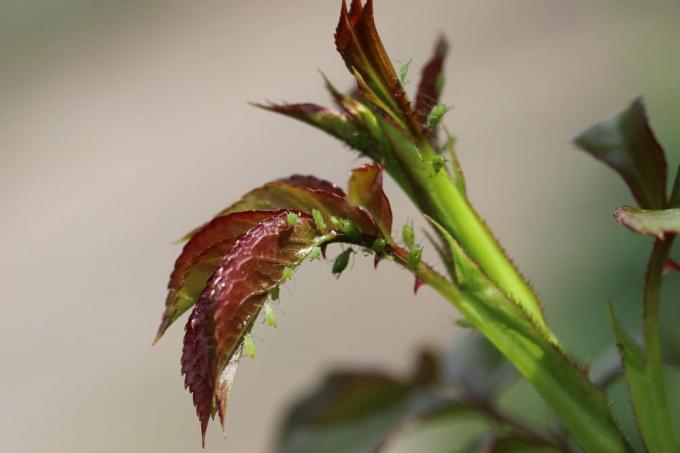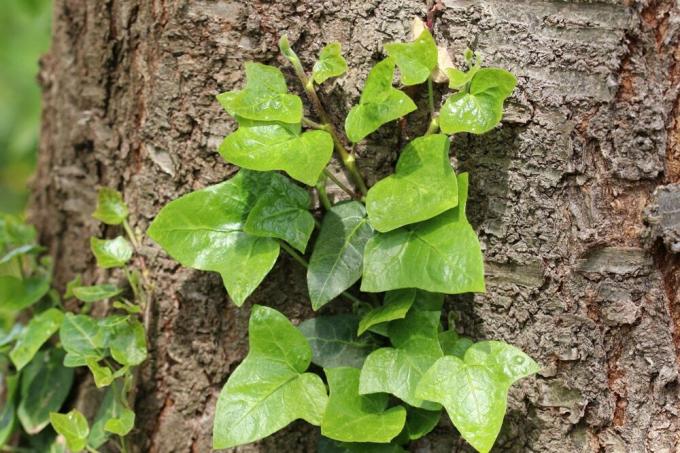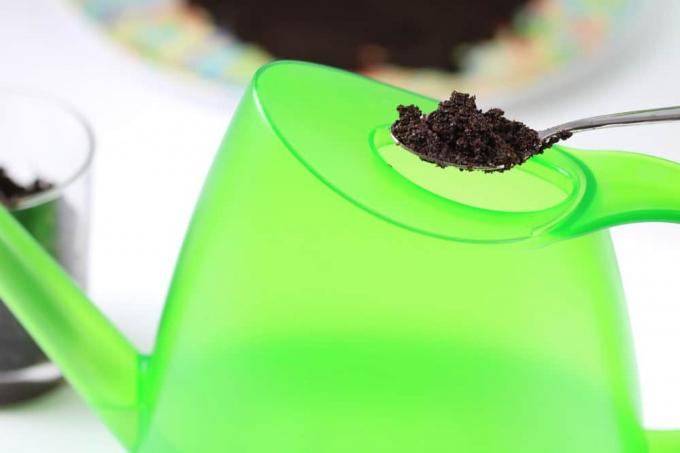

Table of contents
- Instructions for use
- Spices
- Natural suds
- stimulants
- oils
- vegetable brew
Aphids are annoying pests that prefer to spread on weakened plants. They multiply en masse, so that the insects have taken over the entire plant within a short time. They use their mouthparts to pierce the veins of leaves to suck the sap. You can kill the pests with various household remedies.
Instructions for use
While the pests can be removed with a hard jet of water in the case of a light infestation, a mass spread requires other means. Numerous home remedies have proven to be effective here. They are distributed on the plant with a spray bottle. Depending on the weather, the agents work for different lengths of time. If the plants are exposed to rain, the substances wash off quickly and the treatment should be carried out more often. Cover the substrate before spraying to prevent the solvents from getting into the substrate.
Spices
They are rich in essential oils and other effective ingredients that are proven to be effective against aphids. Because of their intense aroma, the spray solutions should be used every five to ten days.
oregano
The spice plant is rich in essential oils, tannins and bitter substances. To prepare a solution you need 100 grams of fresh plants. Alternatively, dried herb with an intense aroma is suitable. A quantity of ten grams is sufficient here. Pour boiling water over the herb and let the tea steep for 15 to 20 minutes. The plant parts are sieved before the extract is diluted with water. One part water for three parts broth.
- fresh herb contains more essential oils
- dried spices lose fragrance through storage
- long-stored herb is less effective
Garlic
The tuber contains various sulfur compounds that mix when cut. Chemical reactions produce sulphurous decomposition products, which are responsible for the smell of garlic. This aroma has a repellent effect on foliar pests. An effective home remedy can be made with 40 grams of garlic and five liters of boiling water. The tea should steep for three hours and then be strained.
Tip:
Chop up a clove of garlic and stick the pieces into the ground. This method prevents pest infestation.
Natural suds
Substances containing soap help to control foliar pests. They are not only found in products that are used in the home. Plants also produce soap-like substances.
ivy

The leaves of the ornamental plant contain saponins that foam when washed out. These secondary plant substances protect against herbivores. Gather a handful of leaves from the plant and roughly chop them. Pour a liter of boiling water over the leaf material and let the brew steep for at least 30 minutes. After the solution has cooled, the plant parts are removed and squeezed out well. In this way, other ingredients are dissolved.
- Helps with heavy infestations by aphids
- Medium can be applied daily if necessary
- Rinse the plant with clear water after successful treatment
chestnuts
The fruits of the deciduous tree are rich in saponins and can be used in the same way as ivy leaves to prepare soapy water. About 15 chestnuts are roughly chopped and poured over a liter of water. After a brewing time of half an hour, the leftover fruit can be sieved out. If the infestation is very advanced, the plant can be sprayed with the solution several times a day.
- Soapnuts have the same ingredients
- Stir while cooking so the stock doesn't boil over
- Treat medium pest infestations every two to three days
soft soap
Natural vegetable soaps are not suitable for this product because the oils they contain can damage the plants. Curd or soft soap contains no added fragrances or dyes. It is free of thickeners and has no excess fat. Choose a potash soap with a pH of ten. Rub 50 grams off a bar of curd soap and dissolve the amount in a liter of water. Hand-warm water accelerates the liquefaction of the soap. Allow the solution to cool and spray the leaves on both sides.
- Medium also harms beneficial insects such as hoverflies
- Use solution with care and only spray on aphid colonies
- exposure to light and good ventilation quickly wear off
baking soda
Sodium bicarbonate changes the pH value in the aphid organism. For the basic recipe, half a teaspoon of baking soda is dissolved in a liter of water. To prevent the aqueous solution from running off the leaf surface immediately after spraying, you can add a teaspoon of cooking oil or a quarter of a teaspoon of grated curd soap. Mist the plant daily. Used outdoors, the remedy is also effective against ants, which feed on the sticky, sweet secretions of the pests.
Tip:
If you don't have baking soda at home, you can double the amount of baking soda.
stimulants
These products can be found in many homes. Leftovers and waste products can be reused for pest control. Spray the remedies on the affected plants every two to four days.
coffee grounds

Many pests don't like the roasted flavors that develop in coffee grounds from cooking. In order for the fragrances to unfold completely, you can pour boiling water over coffee residues that have already been used. Let the brew steep until cold. Sieve the coffee powder and soak a cloth in the solution. This is used to wipe foliar pests and their sticky secretions known as honeydew off the leaves. As a preventive measure, you can distribute coffee grounds on the substrate so that the aroma spreads through the air.
- Coffee grounds contain nitrogen
- do not distribute too much coffee on the substrate
- avoid direct contact with the roots
tobacco
A brew made from cigarette butts is considered a tried and tested household remedy, because the nicotine it contains acts as a strong neurotoxin and reliably kills pests. To make the broth, 50 grams of tobacco are boiled with one liter of water. The coarse remains are sieved out before the agent is sprayed on the leaves. The use of nicotine-containing substances is prohibited outdoors, since the nerve toxin not only kills vermin. If the ingredients get into the soil, microorganisms can be damaged.
Black tea
This home remedy proves to be effective against an advanced infestation of aphids. Steep two tea bags in one liter of water for at least 15 minutes. Boiling hot water ensures that the essential oils are released from the tea herbs. These have a deterrent effect on aphid species. Before using the remedy, the tea should have cooled down to room temperature.
alcohol
With a cotton swab soaked in alcohol, you can dab isolated pests from the plant. A solution of 80 percent water and 20 percent spirits with a few splashes of washing-up liquid is not only effective against aphids but also against scale insects and mealybugs. Pure alcohol or spirits can increase the effect of the individual remedies. Add two teaspoons to the prepared solution. You should not use this mixture on orchids and roses. The alcohol damages the protective wax layer on the leaves.
oils
They have scents that repel aphids. At the same time, oils ensure that a fine film forms on the leaves. Under this layer, aphids die off within a short time because they can no longer breathe.
neem oil
The oil of the neem tree has an intense aroma reminiscent of the smell of sulphur, onions and garlic. It is obtained from the drupes of the plant. A solution with neem oil rids the plant of aphids without harming the beneficial insects. The ingredients disrupt the metabolism and prevent a massive increase in leaf pests. Therefore, you have to use the remedy more often until all pests are eliminated. It is a universally applicable plant protection product with natural ingredients. The tincture consists of a teaspoon of oil and a liter of water.
tea tree oil
The oil has antibacterial and antiviral properties. In addition, it has an antifungal effect. Of the approximately 100 different substances, a certain terpene alcohol makes up the majority. This ingredient is effective against the proliferation of aphids. Add ten drops of tea tree oil to a liter of water and spray the affected plant. A splash of detergent ensures that the oil dissolves in the water.
- effective against many vermin
- Lavender or geranium oil has a similar effect
- great effect by dabbing the pests directly with a cotton swab
vegetable brew

From spring to autumn you can collect fresh leaves of nettle, tansy, wormwood or bracken and make a decoction. One kilogram of fresh leaves is infused with ten liters of water. Put the vessel in a warm place and let the brew steep for two weeks. During this time, fermentation processes take place, which leads to unpleasant odors. Rock flour suppresses odors. After the brew has steeped, one liter of liquid manure is diluted with ten liters of water.
- Wormwood is effective against green aphids
- black aphid species appear unimpressed
- A dash of vermouth liqueur is a good alternative to vermouth
 garden editorial
garden editorial I write about everything that interests me in my garden.
Learn more about pests

Identifying wood pests: overview
In nature, insects that break down wood make a valuable contribution. If the wood is a roof truss, for example, the insect becomes a pest that must be combated in order to avoid expensive damage.

Mole Cricket: Should You Fight Them? | Were in the garden
The mole cricket, or Werre, as it is also known, often lives unnoticed in gardens and parks. Because the insect with the scientific name Gryllotalpa gryllotalpa spends a large part of its life underground. Fighting them is only necessary in a few cases.

Combat Whitefly | 11 home remedies for whiteflies
The whitefly is a tiny creature whose presence on our plants can have unpleasant effects. If a few specimens come across a healthy garden, there is hardly anything to fear. If the flies are there in droves, proven home remedies must be used immediately.

Ant remedy | 13 natural remedies against ants
Ants are more than annoying bugs. In nature, they contribute to the preservation of the forest and keep pests away. If they undermine the terrace slabs in the garden or penetrate into the house, they must be fought. Which natural remedies are effective?

How does ant spray work? Is it toxic to humans?
Many people use special sprays from well-known manufacturers when fighting ants. Their effect is indeed efficient. However, these synthetic agents not only have advantages but also disadvantages in terms of environmental impact and health. It is therefore advisable to resort to natural means.

Drive away cockchafers: recognize grubs | 5 natural enemies
"Fly maybeetle!" says an old children's song about death and destruction. In fact, the larvae of the cockchafer, the grubs, can cause considerable damage in some years. How to fight the plague with natural means.


